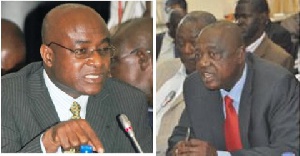Minority in parliament have hinted of a legal battle in opposition to plans to pass the Communication Service Tax amendment. But Majority Leader Benjamin Kunbour says, government is ready for the political consequences.
The amendment to the Communications Service Tax Bill divided parliament on Wednesday and forced the Speaker to suspend its consideration.
Although deliberation was suspended, the majority are resolute in pushing it through as they are convinced it is urgent.
The amendment will levy taxes on international calls and emails received. Government intention is to explore additional loopholes under the Communication Service Tax Bill passed in 2008.
The proposed amendment will levy another 6 cents per minute on international calls coming into the country and internet usage such as using emails.
The telcos are to allow access for government officials to monitor the accruing revenue. A company’s refusal to pay the tax after the first 30 days will attract a penalty of 5 cents of annual gross revenue of the last audited financial statement.
If after 90 days a telecommunication company persists, the National Communications Authority will withdraw its license.
But the Chief Executive of the Ghana Chamber of Telecommunications, Kwaku Sekyi-Addo, says to increase taxes on some telecommunication services "does not look good" for the industry. It will be “overburdening,” he said.
The minority, led by Osei Kyei Mensah-Bonsu is also warning that the government may be breaching international regulations if it goes ahead to tax the public for receiving international calls.
Fredrick Opare Ansah, MP for Suhum and ranking Member of Parliament’s Select Committee on Communication, referred to a Melbourne Convention of which Ghana is a signatory. It stipulates that signatories to the convention can only levy taxes for services originating from its country, not from another country.
Speaking on Top Story on Joy FM, Mr. Opare Ansah who is an I.T expert, said the telcos have prevailed in a High court ruling on inter-connectivity. In his view, passing a bill on an illegality could be declared as null and void by the Supreme Court. Parliament was not sacrosanct, he noted.
The MP is confident the Supreme Court would easily throw out the bill if passed. “It is a total waste of parliamentary time,” he assessed.
He also rejected claims by deputy finance minister Tony Forson that the revenue from the bill formed part of government’s projected revenue this year.
He explained, government only mentioned in the budget that they would be consulting telcos on the issue.
The majority leader and head of Government Business in parliament, Dr. Benjamin Kumbuor acknowledges there will be consequences but insists government must be left to face those political consequences.
He said parliament would ensure that the amendment will identify the particular base that it wants to tax. In effect, the house will ensure the amendment would be crafted in a manner that passes the test of legality.
Nonetheless, he says parliament cannot prevent the executive from passing a policy decision that “is not so absurd”. The minority should leave the government to face any political consequences of this executive policy position.
“Government is the one that will take political responsibility for that policy decision to tax. It comes with consequences,” Kunbour charged.
General News of Thursday, 4 July 2013
Source: joyonline
Minority hints of legal battle against gov’t
Entertainment
















